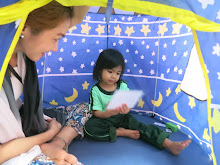I have a confession to make. I'm appalled by traditional methods of parenting and "teaching" and it scares the soul out of me for my child.
I have been into early childhood education field for almost 8 years. I was a teacher using traditional methods and it was until I became a mother that made me realize that I have done such a tremendous error in teaching back in the days.
I was the traditional teacher in a classroom filled with 3-4 year old toddlers, some were as young as 1.6 year olds, and others about 4-5s. I used to make lesson plans, reports, follow curriculum, and all other "important" teaching tools, visual aids and stuff. But guess what, that was a huge blunder. However, like any other life blunders, we learn from it. A mistake that led me into a better practice, and a calmer mother.
How come following a "curriculum" or making lesson plans are now defaced in some educational philosophies? There is a huge and research-backed reasons for that. Ok, i still use visual aids though, but that is no longer about "entertaining" children.
I am a heavy follower of REGGIO EMILIA approach. If you have not really heard about that, it's quite an age-old approach actually back in world war II days. You may look up for a more profound understanding about the approach.
Why lesson plans scare me?As an independent homeschooler, I follow no curriculum, i make no lesson plans day in and out, I don't create ANYTHING at all. How did I survive homeschooling my child? I follow my child. I follow her lead, not her following my "teaching" agenda. She is my curriculum, our themes are formed based on her interests, there is no timeline or limit when to stop or move to another topic.
I am scared of lesson plans and pre-planned activities for the day, or themes for the week, and all other things that are prepared by adults. Why?
My child has her own unique way of exploring, discovering, learning, questioning things. If I make preplanned activities for the day, I rob my child's natural way of doing things in her own. I rob my child's chance to imagine things on her own. I rob my child's capacity to define things on her own, to make meanings of things she does, to understand things in the way she operates.
When I was a teacher, we prepared themes and lesson plans. Regardless of whoever child is participating, we teach what's written on the lesson plan anyway. That method scares me until I became a mother.
What if, it is not my child's interest?the subject does not appeal to her?what if my child is just not into it? Do we label her as stubborn, unparticipative, uncooperative or simply lacks social skills? I dont think so.
Fast forward, I became a mother, then I realized the value of connection to a child. I realized the value to going deeper than just papers and worksheets. I realized, it is not the portfolio's that calculate my child's intelligence. It is her that matters. Not the lesson plans, not the output, not the hardcopied collection of worksheets. It is my child that matters. It's how I guide my child to be more inquisitive, more questioning about all that exists, it's how we discover things together, learn things together. It is not giving direct answers to her questions, it is how we both question things and discover the answers together.
Do I get this kind of focus in schools? Does my child really become the best of who she is in schools? Or maybe, she becomes too competitive and get obsessed with award in schools? To get credit that proves of her intelligence? Knowledge is not proven by a number or grade. Intelligence is not measured by awards. Skills does not progress when it is not your interest. So yes, I gave up on strict school standards, I gave up on lesson plans, I gave up on curriculum and themes...because without all of these adult-made subjects, my child continues to learn based on her own interests, at her own time and pace.




